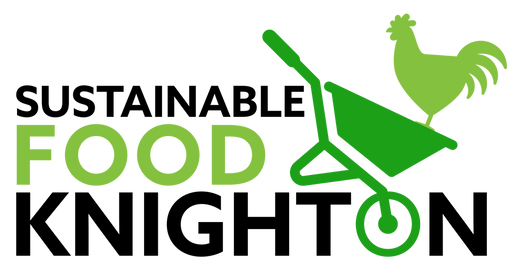|
Sustainable Food Knighton was asked to contribute to the Knighton Christmas Countdown, a daily "advent calendar" of activities and online offerings. We decided to contribute a video cookery demo featuring a tried and tested vegetarian nut terrine that would make a delicious non-meat Christmas Dinner centrepiece. For vegans the cheese in the recipe could be vegan cheese. Here's the video and also the recipe in full. Have a happy, safe Christmas! NUT TERRINE
Ingredients 1 large onion, finely chopped 3 sticks celery 1 leek, finely chopped (optional) 2tbsp oil 5-6 oz ((125-150g) chopped nuts of your choice but could include walnuts, hazel, almond, brazil, for example 2 tbsp fresh herbs such as thyme, marjoram and oregano or 2 tsp dried herbs such as thyme marjoram or mixed herbs 3oz (75g) grated cheddar cheese 4oz(100g) brown or white fresh bread crumbs 14oz (400g) chopped tomatoes, drained Salt and ground black pepper Method Pre-heat oven to 190C, Fan 170C or Gas mark 5 and line a 1lb loaf tin. Heat 1 tbsp oil in frying pan and gently fry the onion and leek if using along with the celery to soften but not brown. Add the chopped nuts and herbs and mix well. Heat carefully for a further 5 mins. Season well and take off the heat. Mix the breadcrumbs and cheese together in a dish and moisten with 1bsp oil. Press in a layer of breadcrumb mix into the loaf tin, then a layer of the nut mix followed by a layer of tomatoes. Repeat layers ending with a topping of breadcrumb mix. Press down well and bake for ¾ hour or until firm. Turn out onto a plate. Serve with tomato sauce or sauce of your choice.
0 Comments
The issue of soya being used as feed in intensive poultry farming generates a fair amount of comment over on our Facebook page. In response, one of our members has written the following article.
More than 30 million tonnes of soya are imported into Europe every year purely for livestock from areas totalling around 18 million hectares across the Americas. Almost all this soya is genetically modified because 90–99 per cent of the soya cultivated in the main producing countries consists of GM varieties (GMO Compass, 2014). Globally, just under half of all animal feed made from soybeans and other oilseed crops is consumed by chicken and other poultry. Wales imports 190,000 tonnes of soy a year, mostly in the form of meal and beans for livestock feed. The average land area required overseas each year to produce Welsh soy imports is 94,600 hectares. This is equivalent to an area larger than Monmouthshire, or five times the size of Newport. GHG emissions from land use change, such as deforestation, for growing Welsh imports of soy total over 1.1 million tonnes of C02e each year. Only around 6 -9 per cent of soya beans are eaten directly by humans as whole beans or in soya products like tofu, soya milk and soya sauce. Soya oil is used as an ingredient in many processed, baked and fried foods and in other products (eg toiletries, cosmetics). Most of this soya is non-GM, if not organic The soya used for feed in IPUs comes mainly from Brazil, Argentina and Paraguay, where the most widely grown variety is Monsanto’s Round Up Ready transgenic. GM soya cultivation has been a disaster. Powerful multi-nationals buy up and privatise land for soya, which requires large quantities of herbicides and pesticides, frequently sprayed from aeroplanes. The impact of aerial sprayings of agrotoxins has poisoned local crops, animals, and people and forced many communities off their land and out of food production. The impacts on biodiversity have been calamitous: poisoned water courses and soil and destruction of ecosystems. Local people are given no warning of aerial spraying. In Brazil, over 36 million hectares are now used for growing GM crops, mainly soya, and Brazil is now the largest user of agrochemicals in the world. Currently, soy 'meal' is classed as a by-product, even though from 1 tonne of soy, you get 0.82 tonnes of soymeal and only 0.18 tonnes of soy oil. Palm is another cash crop that has been a disaster for rural communities in the exporting countries. For more info see: The Risky Business Cymru report recently published - https://www.wwf.org.uk/riskybusiness https://sizeofwales.org.uk/education/deforestation-free-nation/ The RSPB, Size of Wales and WWF Cymru have worked on this together and it specifically relates to Wales General: Greenpeace https://www.greenpeace.org.uk/challenges/soya/ https://www.efeca.com/wp-content/uploads/2019/12/UK-RT-on-Sustainable-Soya-APR-2019-final.pdf. There is much more information available if you search. It is an urgent issue. |

 RSS Feed
RSS Feed
